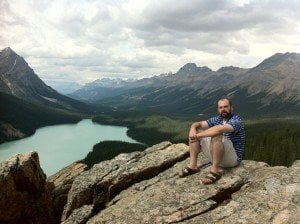 Community is a funny thing. Many of us hold it as an important value in our faith “communities” and our lives. Interestingly, the very idea that we need to hold it as a value may indicate something particular about life in our context.
Community is a funny thing. Many of us hold it as an important value in our faith “communities” and our lives. Interestingly, the very idea that we need to hold it as a value may indicate something particular about life in our context.
I imagine a time when it was less a value and more a reality taken for granted. There was a time in our history when we knew that no individual could survive on their own. This remains true now but the others involved in my survival may be people I’ve never met. For example, distant farmers who produce my food and distant city engineers making sure the water and sewer work properly. All people on whom I depend for survival but with none of them do I ever interact. There was a time that wasn’t true. All the people we depended on for survival, or most of them, were people with whom we had relationships. And because, for most of human history, we were born, raised, and died in the same city or small region, we couldn’t ever leave those people behind.
All those people we depended on for survival, both kin and not, were a simple fact of life over which we had virtually no control. They were what you and I would call a community.
It was, however, a community which we didn’t get to choose. We were stuck with them through good times and bad regardless of how we felt or what they did.
This is not the community that you and I know. All our communities contain an element of choice. If I don’t like the people around me, I can move. Or, I can ignore them and find a group of people in my town that I like. If I don’t like the people who go to my church I can switch to another congregation. This is particularly true for people who live in cities.
The challenge this raises is that instead of community-based on a common need for survival in a (mostly) static location we are building communities on a variety of other things. We use common hobbies, common demographics, and common ideas. Or, we create community built around feelings of care and affection. The needs these communities meet are not so pressing as that of survival. This means that these communities won’t hold together as hobbies, demographics, ideas, or feelings change. The commonality disappears and so does the community.
Maybe that’s not a bad thing but it’s worth wondering about what we lose when community is just an option. Certainly, the model of Christian community that Paul lays out when he talks about the Body of Christ doesn’t seem optional. And if community is not supposed to be a practice of convenience what price are we willing to pay for maintaining our relationships when our community no longer seems to suit us?

By vamna nasquerisa March 2, 2016 - 10:18 pm
But what about when the community closes and you made no choice at all? We have lost 3 churches in the local diocese. Some of the members of church communities chooses to travel farther to other churches. Some join other churches. Some decide not to invest so much and become occasional attenders at these new churches. Some stop churching it altogether. Perhaps Jesus may be encountered in Sunday morning yoga class?
By Trevor Freeman March 3, 2016 - 1:54 pm
Thank you for this Vamna. I am sorry to hear of the closure of worship spaces in your area. It is always a very sad thing when that happens. Further, thank you for your continued faithfulness through such sadness.
The question your response raises for me is how we define the boundaries of our community. I know it might be naive but I want to think that just because our building closes doesn’t mean our community closes. Is it possible for us to meet together elsewhere and to maintain those bonds that developed in a particular building? My own thinking is so bound up in the boundaries of buildings and parishes that it’s hard to think otherwise but the boundary of our community is really only defined by our baptism. And even that boundary is one we make porous so that others can be brought into our shared life. Is it possible for us to imagine our community bonds surviving the loss of worship spaces and parishes? I hope it is.
And for the record, I do think it is possible for Jesus to be encountered in Sunday morning yoga class. I believe that Jesus can be encountered in every part of creation but in particular in the faces of the people around us.
Thanks for taking the time to read this post and think about it.